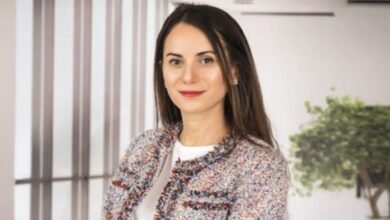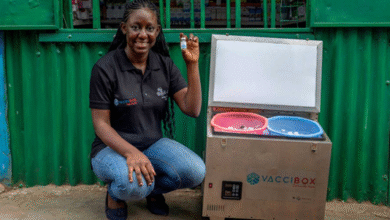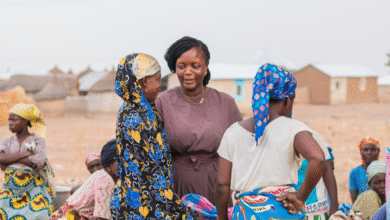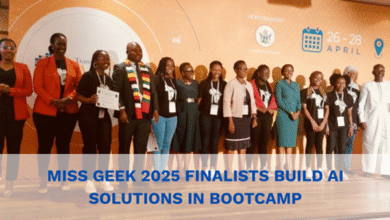Career Minna Salami Miss Afropolitan
With her frizzy hair, a delicate silhouette with African curves, and her colored skin, Minna Salami, 30 years old, is a condensate of an African woman in 2020. Talent, ambition, innovation, open-minded, cosmopolitan… and passionate about Africa.
Fasy flow, hands moving everywhere, Minna explains: « I was born in Finland where my mother is coming from, and I left for Nigeria when I was two months old. I studied in Lagos until secondary. With the dictatorship, we moved to Sweden, where I finished my studies in political sciences. » After that, New York, the dream, the beginning of a professional career in marketing and love. But without a visa, she has to leave. Sad and with a broken heart, she goes to London. And there everything starts. With a blog, Reveling Me. « Since I’m 4 years old, I want to write… But I dind’t know how to do it. Thanks to new technologies and blogs, I was able to start. And I loved it ! » She quickly left marketing for her blog. « In 2010, I decided to refocus. I did a master at the School of African and Oriental Studies in London on gender issues. So I created Ms. Afropolitan. » The contraction of African and cosmopolitan. « My writing had more impact. At the same time, I was teaching at university about new media. I’m still teaching. I gave a series of conferences. I did some consulting for Nigerian companies. All of this, thanks to the blog! » In 2012 she reached more than 2 million pages viewed and count more than 10 000 fans. Meanwhile, she develops Miss Afropolitan Shop. The success is so impressive British media start to talk about her. She is among the 40 African innovators, the 50 women more connected, or bloggers of the year.
« African women have to lead their resolutions »
« Sometimes we say I’m a provocateur, but it is not about that. I talk about different subject, feminism, pornography, blending… » And she denounces speeches, slogans subliming and flatter the women of the continent. « If we were as great, why don’t we have the power? We can be Africa’s future, but for that, African women have to lead our revolution. And this is not easy. I’m convinced that women must unite to defend themselves. Whatever the country, fights are the same. » And thanks to expression places like Ms. Afropolitan, linking, federating, they can do it!
« A black feminine approach for everyone »
Today the author publish « L’altra banda de la muntanya » (Sembra Llibres, 2020), an interpretation of the black feminine world aiming to break imperialism, capitalism, and patriarchal schemes. She feels like a woman living in two worlds: Africa and Europe. « I speak to people who are tired of the world appearance, of oppression structures, with a system hiding the truth and beauty… With people tired of ugliness, oppression, inequality, poverty, women, and nature’s exploitation… This is why the subtitle is a black feminine approach for everybody. But actually, in the whole book, I’m conversing with black feminists because I choose the canon of black feminism and some experiences black families share. I also talk to people who are interesting in the role of the arts in transformation. »
An invitation to think about feminism how it is schematized today, « white, » « black, » « trans »… A division that helps the patriarchy. « Different types of feminism join and are close to each other. But at the same time, it remains patriarchal knowledge-creating relationships and crises with hierarchy and divisions. More people, feminists, and other groups and the society join more they start being in conflict. Nobody pulls the rope in the same way. To change that, we need to use sensual knowledge, holistic knowledge and focus on women in the way we produce knowledge in how we talk about movement. As long as we operate in patriarchal knowledge areas and act to create divisions, compete between each other, which are mechanical reactions, like a robot, we can’t really sit together and learn the ones from the others and listen. And we need to listen to what other women experienced. But they will discover African women have lived traumas and pain and history in which Europeans are accomplices. This can change and operate in the way of political fraternity, which is necessary if we want to change the patriarchy. Maybe we need men, maybe not… »






